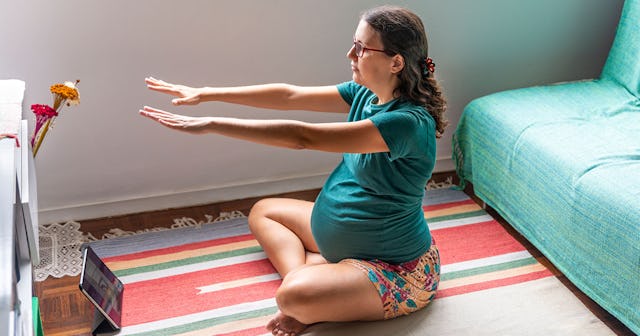Virtual Doulas Are A Thing

If there is anything that has come out on top of this pandemic, it has to be Zoom. Thanks to Zoom, you have been able to go on with life relatively uninterrupted, although in a very different format. You can virtually go to school, work, cocktail hour, live shows, a therapy session, girls’ night in, family gatherings, and so much more. And many people’s professions have been saved by being able to dial in via a video conferencing platform — one of which is doulas. Yes, you can work with a virtual doula on Zoom, and some expectant parents are choosing this as an option.
Due to hospital regulations during the pandemic, extra people, including doulas — and, in some cases, even partners — are currently not allowed in many hospital delivery rooms to support those in labor. But it is important and comforting to have someone there to support and advocate for you. So pregnant people have had to find creative solutions to have support during birth. Thankfully, doulas have continued to help their clients by providing everything from prenatal and postnatal Zoom sessions to FaceTiming in the delivery room.
Dr. Zaher Merhi, an OB-GYN based in New York City and Westport, Connecticut shared with Today Parents, “Labor is a strenuous act for any patient, and receiving the adequate comfort during this act is crucial. The introduction of virtual doulas has been a great tool for assisting patients during labor. The support that the doula provides to the patients ends up reflecting on her in the way she progresses through labor, making our job as OB-GYNs easier.”
Fly View Productions/Getty
Some of you may be reading this and asking, “What the heck is a doula?” Dona International, a doula certifying organization, defines a doula as “a trained professional who provides continuous physical, emotional and informational support to a mother before, during and shortly after childbirth to help her achieve the healthiest, most satisfying experience possible.”
There are two types of doulas: birth and postpartum. Most people are familiar with birth doulas, but don’t always know what they do. Birth doulas offer physical support by providing coaching during childbirth and help with position ideas, breathing techniques, and pain-reducing measures such as massage and counter pressure. They help emotionally support the birthing person and their partner. And birth doulas provide evidence-based information to families so that they can make informed decisions and advocate on their behalf during labor and delivery.
Postpartum doulas provide many of the same support services during the postpartum period as clients transition into parenthood. Being a new parent can be a very vulnerable time, and postpartum doulas provide parents with hands-on, practical support with their new little one. They can help with breast and bottle feeding support, soothing techniques for the baby, providing nourishing meals, and much more. And overall, postpartum doulas help parents and everyone in the family unit, including siblings, grandparents, and any other family members, adjust to the changes that come with adding a new baby to the family.
Erica Chidi Cohen, a doula and the co-founder of wellbeing brand LOOM, expressed her concerns with Healthyish.com: “When the pandemic began, I had to ask myself, How do I continue to be continuously there? How can I continue to educate and help them prepare to advocate for themselves?” She shared, “I thought if they’re open to having me on FaceTime and in constant communication over text, I’ll still be there.” And although offering these services via video conferencing, texting, and emails is not ideal, it is proving to be a viable option for doulas to continue to provide support to expectant parents.
Dean Mitchell/Getty
In a study on the global doula response to COVID-19, researchers Julie Johnson Searcy and Angela N. Castañeda spoke to doulas worldwide. Although many of the doulas surveyed agreed that virtual doula work presented a number of challenges, the majority of doulas were able to make the shift to virtual labor work. A South African doula shared, “I explain in depth what virtual support looks and feels like. I help set up the technology necessary and practice ahead of time that we can get good camera angles etc. and I ‘attend’ the birth pretty much as if I were there in person.”
At the end of the day, virtual doulas are still able to provide services that the families they serve benefit tremendously from. And although video conferencing platforms like Zoom have provided a viable alternative to in-person care during this pandemic, doulas cannot wait to get back to the hands-on, personal support and care they are accustomed to giving their clients.
This article was originally published on